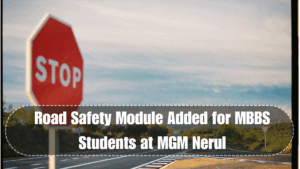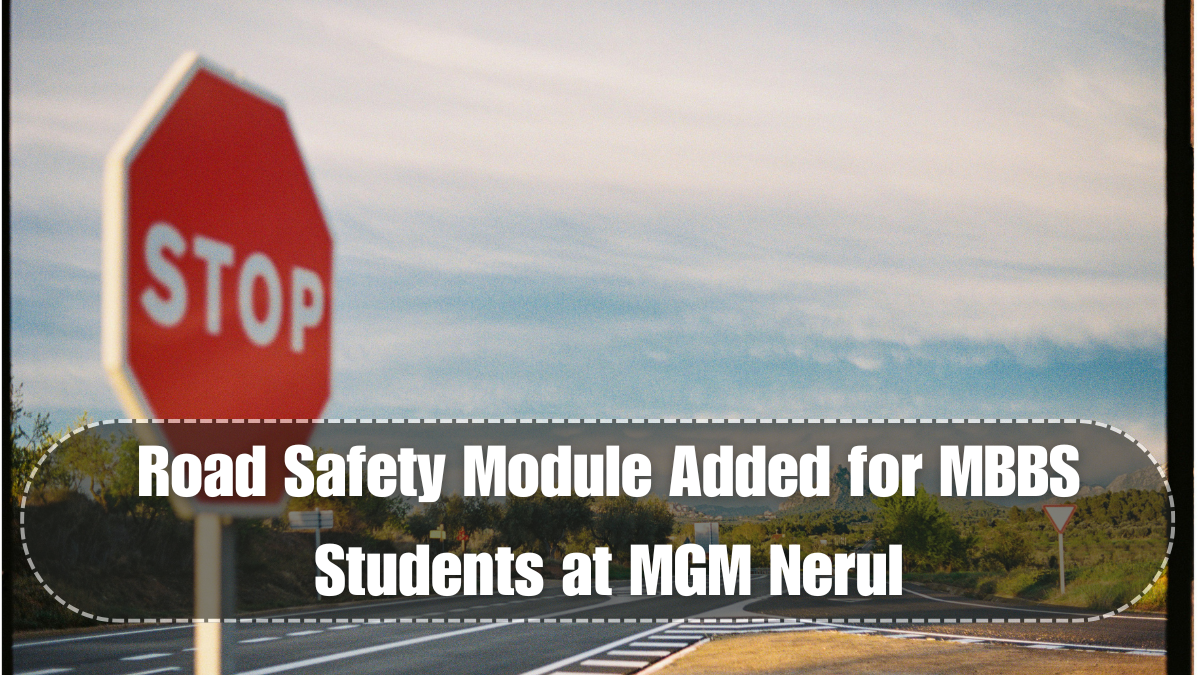In a strong step toward responsible mobility and medical professionalism, MGM Medical College in Nerul has launched a medical student road safety course as a mandatory part of its academic curriculum for 2025. With rising traffic accidents involving young adults and medical students often commuting late hours for duty, this initiative comes at a crucial time.
The course has been designed to build awareness of driving ethics, road traffic laws, and emergency handling among MBBS students. By integrating it into their studies, MGM aims to shape future doctors not just as caregivers but also as responsible road users. This move reflects a national push toward making road safety an educational priority at both school and college levels.
With many young medical aspirants using two-wheelers or shared mobility options to travel to hospitals and clinics, instilling safe travel habits early is essential. The MBBS student course emphasizes the significance of personal responsibility, preventive awareness, and emergency response—especially relevant for students frequently exposed to real-life medical emergencies.

Course structure and module highlights
The newly introduced medical student road safety course at MGM is structured over four weeks and includes both theoretical and practical training. Topics range from traffic rules to hands-on helmet fitting sessions, along with ambulance logistics training. Key elements include:
-
Module 1: Road Traffic Rules & Licensing Awareness
Covers the Motor Vehicles Act, RTO rules, and learner license requirements. Students learn the legal aspects of driving, how to apply for licenses, and penalties for traffic violations. -
Module 2: Two-Wheeler Safety Protocols
This section includes helmet importance, gear usage, visibility enhancement, and accident case studies. The course explains how minor negligence can lead to life-altering consequences. -
Module 3: Ambulance and Hospital Transport Etiquette
This segment bridges medical training and transportation, explaining how doctors and paramedics must interact during patient transfers. Students also receive insights on handling real-time ambulance delays and traffic cooperation. -
Module 4: Emergency Situations and First Aid Response
Students are trained on how to assist at an accident site while ensuring their own safety. This includes CPR, spinal injury handling, and calling for professional help.
These modules are supplemented by real case discussions from Navi Mumbai’s traffic records and hospital reports. As part of the MBBS student course, students must pass a short evaluation at the end to receive certification.
Real-world relevance: Why the course matters
According to a 2024 NCRB report, young adults aged 18–25 make up nearly 34% of road accident victims in India. Among them, medical and engineering students often feature prominently due to erratic schedules, late-night shifts, and heavy commuting on congested roads. The medical student road safety course at MGM addresses this issue directly.
By making safety a part of medical training, MGM is pioneering a change in how colleges address student well-being. The emphasis isn’t just on protecting students but also preparing them to be community leaders. These future doctors, after all, will influence public attitudes toward health, including road safety and trauma care.
MGM also plans to publish research comparing pre- and post-training attitudes toward transport behavior. The insights from this initiative could shape policy-level changes in hospital HR practices and medical internship orientation programs across India.
Partnerships and institutional backing
The course is being run in collaboration with the Navi Mumbai Traffic Police, the Road Transport Authority (RTO), and local ambulance services. These partnerships allow students to observe how city-wide traffic response systems operate in real time.
Additionally, hospital fleet managers provide insights into hospital transport logistics and ambulance driver coordination. The course bridges classroom knowledge with field operations—a practical approach that makes learning relatable and impactful.
Key benefits of the program
| Benefit | Impact on Students |
|---|---|
| Legal awareness | Reduces instances of traffic violations among students |
| Helmet and safety gear training | Improves personal protection while commuting |
| Ambulance etiquette and protocol | Prepares students for medical logistics coordination |
| First aid response | Enables students to assist safely during road emergencies |
| Community leadership | Builds doctors who champion public safety and trauma care policies |
By combining hospital transport logistics with on-ground safety drills, MGM has made this module a practical asset for every student.
FAQs
Is the road safety course mandatory for all MBBS students at MGM Nerul?
Yes, the medical student road safety course is now a compulsory module for all first- and second-year students as part of the core curriculum.
What does the course include?
It includes training on traffic rules, helmet safety, ambulance coordination, emergency response, and first aid—all tailored to medical students.
Does the course provide certification?
Yes, students receive a certification upon successful completion, which may be added to their academic records.
Are other colleges in India offering similar road safety programs?
MGM Nerul is one of the first medical colleges to implement this structured program. However, more institutions are expected to follow in 2025.
Who conducts the training?
The course is run in collaboration with the Navi Mumbai Traffic Police, RTO experts, medical faculty, and hospital transport teams.
Conclusion
The medical student road safety course at MGM Nerul marks a groundbreaking shift in medical education—one that recognizes the link between professional responsibility and personal safety. As future doctors, MBBS students must be prepared not just to heal but to lead by example, both inside and outside hospitals. This course arms them with the tools to travel smartly, respond to emergencies ethically, and influence the wider public’s attitude toward road safety. It’s not just a lesson—it’s a movement for safer streets, responsible healthcare professionals, and better hospital logistics.
Click here to know more.




